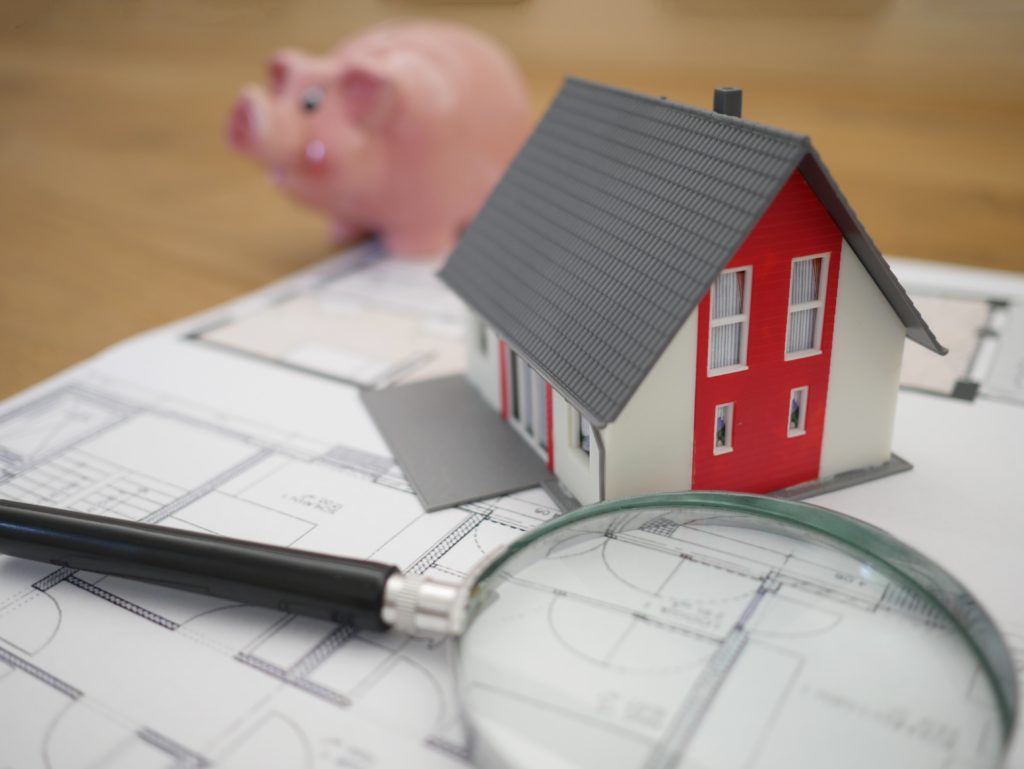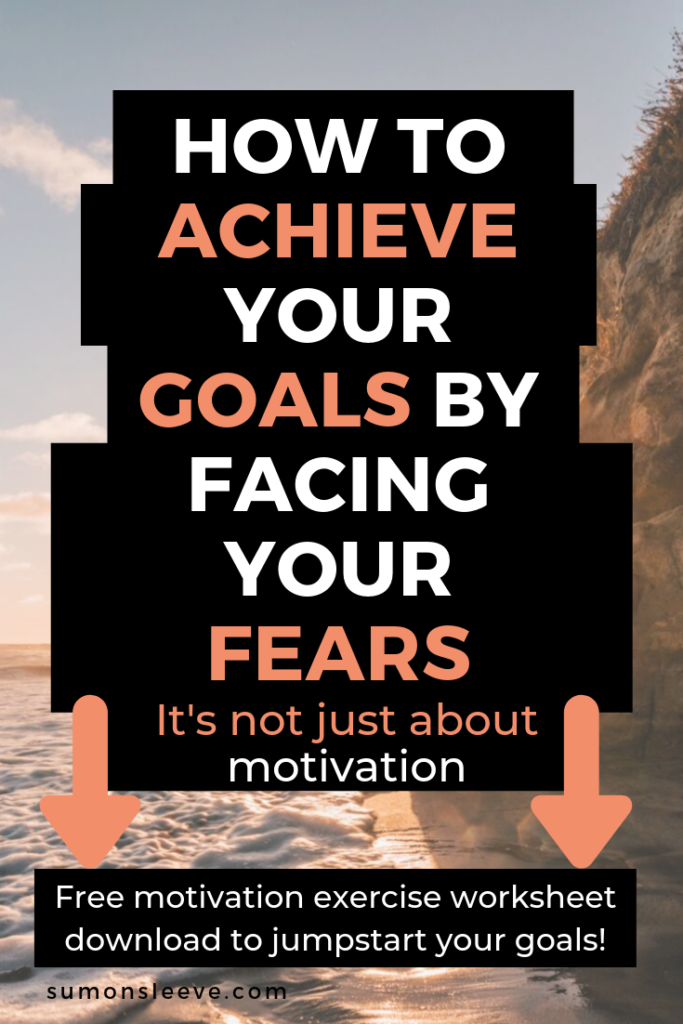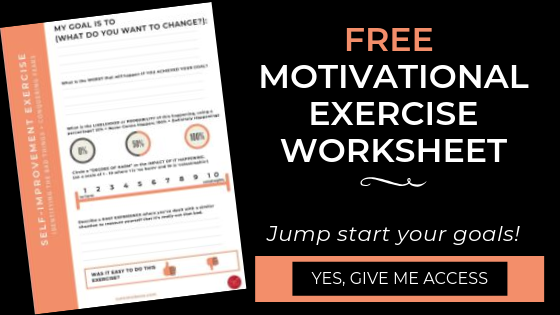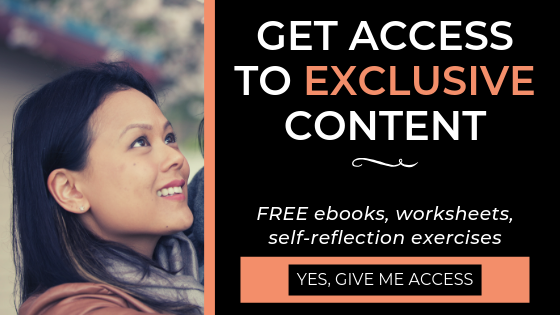“I’m not scared; I’m just not motivated to start my goals right now.”

“I’ll start my diet on Monday.”
“Watching Netflix on a Friday night is way more fun than going out and meeting someone.”
“I don’t have time to workout.”
“Paying off that student loan can wait; these shoes cannot. YOLO!”
I’m going to be straight up with you.
Lack of time, motivation, energy, YOLO, FOMO etc are merely excuses that you use to prevent yourself from achieving your goals.
And excuses are fantastic disguises for your deepest fears.
What do you want to change about yourself?
Make more money?
Get a better job?
Start your side hustle?
Fit into skinny jeans?
Find someone to share your life with?
Start meditating?
Reconnect with your family?
There are basically 3 categories that self-improvement goals fall into:
1. Health
This includes how you feel emotionally, physically, mentally, spiritually and intellectually.
From eating better to starting a workout routine to reading more, these are goals that are internal to your wellbeing.

2. Wealth
This includes your assets, career, finances, business, material goods, living situation, home improvements etc.
From getting promoted to renovating the kitchen to saving up for a better car, it’s the environment you are in, how and what you want to change about it.

3. Love
This includes the people in your life, the social environment that you have and the relationships in it.
Goals can be improving romantic relationships, family relationships, friendships, work relationships, relationships with acquaintances, clients, customers, etc.

The self-improvement goal/change always involves more than one category.
It’s never a clear cut goal like “I want to lose 5 pounds.” There are always other mini-goals that play into that main goal.
For instance, you want to start a workout routine because you think when you feel more in shape, you will be more confident to start dating again.
Or you want to work on the relationship with your best friend because the last fight you guys had really tore your health up, mentally and emotionally.
Or you want to save up for a trip to Hawaii because you’ve been burnt out at work and haven’t taken time for yourself in years.
But overall, regardless of which categories the change fits into, the outcome of the change is to work towards achieving fulfillment in life.
As someone who has worked in Change Management for over a decade and certified in coaching since 2011, the hardest moments with making a change in our life is taking action and maintaining the change.

The Real Barrier to Achieving A Goal
Most people focus on the outcome to help motivate them to achieve the goal.
For instance, putting a picture of a fitness model above your bed to remind you of what you would look like if you started working out.
Or another example could be pinning pictures of your dream house on your Pinterest boards to motivate yourself to apply for a better position that pays you more.
But the real barrier to achieving a self-improvement goal is actually the uncertainty in attaining it.
As in, the reason why we don’t take action and start is that we are fearful of what might happen if we actually change.
Humans love stability.
We like comfort.
It’s ingrained in our DNA to seek homeostasis (a physiological state of equilibrium that is resilient against change).
For instance, if your temperature goes up by 1 or 2 degrees, you have a fever and it’s out of balance. Your body immediately tries to course correct (ie. increasing blood flow to the skin and making you sweat like a pig) so you don’t keep heating up.
We’re delicate beings. It’s not just physiologically but mentally.
This exercise will act as a catalyst to help you take action.
So to counter this, what we should focus on when we set goals and want to take action to improve ourselves is to identify these uncertainties.
1. What are the ‘bad things’ you think will happen if you achieved your goal?
Identify those scary/bad things.
For instance, you want to make some new friends. Now imagine you went out there and did that.
Some fears or ‘bad things’ that you think may happen could be:
Your new friends won’t understand your weird hobby; they judge you for it and you have to give it up to keep these ‘new friends’.
You have to spend all your time with these new friends that you won’t have time for yourself.
For each “bad thing”, ask yourself:
2. What is the likelihood or probability of each of these things happening, using a percentage?
Like literally use a number to describe how likely this ‘bad thing’ will actually happen.
0% = never gonna happen; 100% = definitely gonna happen.
Be realistic about it.
3. Assign a “degree of harm” or the impact of it happening.
If you have ‘bad things’ that have a greater than 0% happening, ask yourself,
“How bad is it really?“
And use a number to describe how bad it is.
On a scale of 1 – 10,
0 = no harm done; 10 = catastrophic, like your world will end
4. Use past experiences where you’ve dealt with a similar situation to reassure yourself that it’s really not that bad.
I don’t know anyone who hasn’t struggled or endured some sort of life challenge. (If you haven’t, let me know because I’d love to talk to you about that)
Adversity is inevitable.
Adversity is all part of life’s big plan for us. Throwing shit at us and watching us dodge, duck, dip, dive, and dodge?
From the shitty times during highschool or the car accident that made your life a nightmare or that time you just couldn’t land a job, you made it out okay remember?
So think of a time when you’ve had to face a similar situation and how you dealt with it.
It’ll remind you that whatever happens, you’re absolutely capable of dealing with it.
5. Lastly, was this exercise easy to do?
Evaluating the difficulty of this exercise allows you to self-reflect on what really matters when trying to achieve this goal.
If it’s easy, then it gives you insight into how you’re going to approach the goal. (ie. the certainty gives you the courage to face the fears)
If it’s difficult to assign numbers to your fears then it’s not a reality you will be facing (ie. the uncertainty outweighs the fears)
You have to be realistic about these questions.
It puts you in an objective position to rate your fears.
Most of the time, it’s hard to say whether something bad will actually happen and how it will impact us because we don’t know what we don’t know.
Here’s an example of how I did this exercise myself to help me take action.
Late last year, I told myself that I needed to start doing videos so that I could reach different audiences.
People want their content delivered in different mediums because everyone’s attention is different.
So I set a goal to make a video.
Just one video.
And that goal didn’t get achieved. I procrastinated. I set it aside.
I made excuses for myself like:
I’m busy. I don’t have time.
I don’t have make-up on or my outfit sucks.
Or the lighting isn’t good enough.
Or I have “better” things to do.
I sat down and did this exercise.
I was scared of the bad things:
What if they didn’t like my voice?
Called me ugly and fat?
Told me I don’t know what I’m talking about.
That I’m a loser or an idiot?
How likely was that to happen?
At least 80%.
Probably likely given how others in the public eye have been scrutinized like hungry mosquitoes attacking a juicy naked blob of flesh.
What will be the damage?
Hurt ego, upset feelings, poor self-esteem and a lack of motivation to keep doing them.
So what?
I go back to my days of getting bullied, to the days of being told I couldn’t do this or that because I’m not good enough or it’s “not within my realm”, the mean comments I’ve seen already from my written work.
Plus my history of being my own worst critic…the one who said the worst shit to myself.
How bad can it really get?
Check out all my videos here, proof that I faced my fears and that I practice what I preach (well, most of the time)
So Readers, what is a goal that you’ve been contemplating for a while now? What fear is holding you back?





